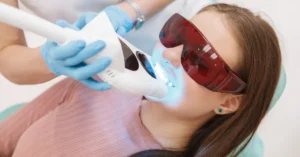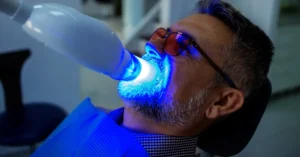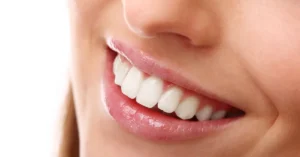Effective Teeth Whitening for Sensitive Teeth: Methods and Products to Try
For those with sensitive teeth, the thought of teeth whitening might raise concerns about increased discomfort or sensitivity. Fortunately, there are safe and effective teeth whitening solutions available for sensitive teeth, allowing everyone to achieve a whiter, brighter smile. Read on to learn about the best teeth whitening products for sensitive teeth, including both professional and DIY options, as well as natural remedies and specific methods tailored to sensitive gums.
[toc]
Causes of Tooth Sensitivity
Understanding the primary causes of tooth sensitivity is the first step towards finding the best whitening methods. Tooth sensitivity can result from various factors such as:
- Gum Recession: When gums recede, the sensitive part of the tooth, known as dentin, can become exposed. This exposure can lead to discomfort, especially when consuming hot, cold, sweet, or acidic foods and beverages. Gum recession can be caused by aggressive brushing, gum disease, or aging.
- Enamel Erosion: Enamel is the hard, protective outer layer of the teeth. Over time, enamel can wear away due to acidic foods and drinks, brushing too hard, or age-related factors. When enamel erodes, the underlying dentin becomes exposed, leading to increased sensitivity.
- Tooth Decay: Cavities and tooth decay can lead to sensitivity, particularly when they occur near the gum line. As decay progresses, it can expose the dentin and nerves within the tooth, causing discomfort.
- Teeth Grinding: Also known as bruxism, teeth grinding can wear down enamel over time. This habit often occurs during sleep or due to stress, leading to increased tooth sensitivity as the protective enamel layer becomes thinner.
Sensitive Teeth Whitening Solutions
There are several effective sensitive teeth whitening solutions to explore:
Sensitive Teeth Toothpaste: Before starting any whitening regimen, it’s advisable to use a toothpaste designed for sensitive teeth. These products often contain ingredients like strontium chloride and potassium nitrate, which help reduce sensitivity by blocking pain signals to the nerves. Regular use of these toothpastes can strengthen enamel and reduce overall sensitivity, preparing the teeth for whitening treatments.
Sensitive Teeth Whitening Gel: Many at-home whitening kits contain high-concentration gels that can cause sensitivity. Opt for lower-concentration alternatives (10% or less hydrogen peroxide) that are gentler on the teeth. These gels can provide effective whitening results while minimizing discomfort, making them suitable for individuals with sensitive teeth.
Teeth Whitening Strips for Sensitive Teeth: Whitening strips are a popular at-home solution. For sensitive teeth, look for strips that use milder ingredients or are specifically formulated for sensitivity. These strips typically have a lower concentration of whitening agents and are designed to minimize irritation.
Teeth Whitening Toothpaste for Sensitive Teeth: Regular use of a whitening toothpaste designed for sensitive teeth can gradually lighten stains while reducing sensitivity. These toothpastes often contain gentle abrasives and whitening agents that remove surface stains without causing significant discomfort.
Teeth Whitening for Sensitive Gums: If you have sensitive gums, choose whitening products that are less likely to irritate them. Look for options with gentle formulas and application methods, such as whitening pens or trays that provide controlled application.
Professional Teeth Whitening for Sensitive Teeth
 For those seeking fast and effective results, professional teeth whitening for sensitive teeth is a viable option. Dentists can use potent gels while taking measures to reduce sensitivity, making this method suitable for individuals with severe sensitivity issues. In Naples, FL, there are specialized services available that cater specifically to sensitive teeth, providing personalized care and ensuring optimal results.
For those seeking fast and effective results, professional teeth whitening for sensitive teeth is a viable option. Dentists can use potent gels while taking measures to reduce sensitivity, making this method suitable for individuals with severe sensitivity issues. In Naples, FL, there are specialized services available that cater specifically to sensitive teeth, providing personalized care and ensuring optimal results.
Benefits of Professional Whitening
Customized Treatment: Dentists can tailor the whitening process to your specific needs, ensuring the most effective and comfortable treatment. By assessing the condition of your teeth and understanding your sensitivity levels, they can choose the best whitening agents and methods for you. This personalized approach not only enhances the whitening results but also reduces the risk of exacerbating tooth sensitivity.
Advanced Technology: Professional treatments often use advanced whitening systems that deliver faster and more consistent results. These state-of-the-art systems utilize the latest in dental technology to penetrate deeper into the enamel, breaking down stains more effectively. Additionally, the precision of these systems ensures an even application, resulting in a uniform and brilliant smile.
Sensitivity Management: Dentists can apply desensitizing agents and take steps to protect your gums and teeth, minimizing discomfort during and after the procedure. They can also customize the strength and duration of the whitening treatment to align with your comfort level. Post-treatment care and advice from dental professionals further ensure that any sensitivity experienced is temporary and manageable.
DIY and Natural Teeth Whitening for Sensitive Teeth
For a more natural approach, consider these DIY teeth whitening methods for sensitive teeth:
- Baking Soda and Hydrogen Peroxide Paste. A mixture of baking soda and a small amount of hydrogen peroxide can act as a mild abrasive to remove surface stains. Use this paste sparingly to avoid damaging enamel and causing sensitivity.
- Activated Charcoal. Brushing with activated charcoal can help absorb stains and whiten teeth naturally. Ensure you use a fine charcoal powder to prevent abrasive damage to enamel.
- Coconut Oil Pulling. Swishing coconut oil in your mouth for several minutes daily can help reduce bacteria and whiten teeth over time. This traditional practice is gentle on the teeth and can contribute to overall oral health.
Safest Teeth Whitening for Sensitive Teeth
 When selecting the safest teeth whitening for sensitive teeth, prioritize products with lower concentrations of whitening agents and those specifically designed for sensitive teeth. Consult your dentist to determine the most appropriate and safest method for your unique needs.
When selecting the safest teeth whitening for sensitive teeth, prioritize products with lower concentrations of whitening agents and those specifically designed for sensitive teeth. Consult your dentist to determine the most appropriate and safest method for your unique needs.
Safety Tips:
Follow Instructions: Always adhere to the product instructions to avoid overuse, which can lead to increased sensitivity or damage to enamel. Overusing whitening products can strip away the protective enamel layer, making teeth more vulnerable to discomfort and decay. Carefully following the recommended usage guidelines ensures both safety and optimal whitening results.
Patch Test: Before using a new whitening product, conduct a patch test on a small area of your teeth to check for any adverse reactions. This preliminary step can help identify potential sensitivity issues before they affect your entire mouth. If you notice any irritation or discomfort during the patch test, discontinue use and consult your dentist for alternative options.
Consult a Professional: Discuss your whitening plans with a dentist to ensure the chosen method is safe and effective for your dental health. A dental professional can provide personalized advice and recommend products specifically suited to your sensitivity level. Regular consultations also help monitor your progress and make any necessary adjustments to your whitening regimen.
Additional Tips for Whitening Sensitive Teeth
- Avoid Sensitivity-Triggering Foods and Beverages. Limit intake of coffee, soda, and acidic fruits, which can exacerbate sensitivity. Consuming these items can weaken enamel and increase the risk of discomfort during whitening treatments.
- Use Desensitizing Products. Use fluoride or desensitizing gel before and after whitening to manage sensitivity. These products can help strengthen enamel and reduce pain signals, making the whitening process more comfortable.
- Seek Professional Guidance. Always consult with a dentist before starting any whitening treatment to ensure it is suitable for your teeth and gums. A dental professional can provide personalized advice and recommend the best products and techniques for your specific needs.
FAQ:
What oral hygiene is recommended in the elderly?
Oral hygiene recommended for the elderly includes brushing teeth twice daily with fluoride toothpaste, flossing daily to remove plaque between teeth, using a soft-bristle toothbrush to prevent gum irritation, and regular dental check-ups to monitor and address any oral health issues. Additionally, using an antibacterial mouthwash can help reduce plaque and prevent gum disease.
How do you give oral care to the elderly?
To give oral care to the elderly, ensure they brush their teeth twice daily with fluoride toothpaste, assist them with flossing if needed, and encourage the use of a soft-bristle toothbrush to avoid gum irritation. Help them use an antibacterial mouthwash to reduce plaque and maintain fresh breath. Regular dental visits are essential to address any emerging issues promptly. If an elderly person has dentures, ensure they are cleaned daily and properly fitted.
How to improve oral health in older adults?
Improving oral health in older adults involves maintaining a consistent oral hygiene routine, including brushing twice daily with fluoride toothpaste, flossing daily, and using an antibacterial mouthwash. Encourage regular dental check-ups to monitor oral health and address any problems early. Ensuring a balanced diet rich in vitamins and minerals, staying hydrated, and avoiding tobacco products also contribute to better oral health. Proper care of dentures and avoiding sugary snacks can further enhance oral health.
What is the best mouthwash for senior citizens?
The best mouthwash for senior citizens is an antibacterial mouthwash that contains fluoride to help prevent cavities and strengthen tooth enamel. A mouthwash with chlorhexidine or essential oils can effectively reduce plaque and gingivitis. Alcohol-free options are preferable to avoid dryness and irritation, which are common concerns for the elderly. Brands such as Listerine Total Care Zero and Crest Pro-Health Multi-Protection are good choices for senior citizens.
Teeth Whitening for Sensitive Teeth in Naples – Gentle, Expert Care Awaits
 Achieving a whiter, brighter smile with sensitive teeth is possible with the right care and expertise.
Achieving a whiter, brighter smile with sensitive teeth is possible with the right care and expertise.
At Naples Dental Boutique in Naples, FL, our team of professional dental doctors specializes in providing safe and effective teeth whitening solutions tailored for sensitive teeth.
Don’t let tooth sensitivity prevent you from enjoying a dazzling smile. Schedule your appointment today at Naples Dental Boutique and let our experts guide you through a personalized whitening process that ensures comfort and exceptional results.
Experience the best in professional oral care and achieve the radiant smile you deserve. Contact Naples Dental Boutique now to get started!


